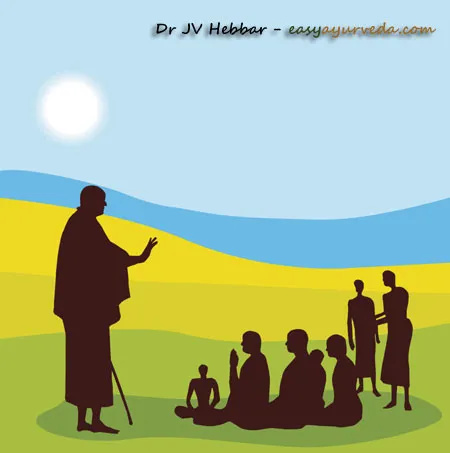
This article explains Madava nidana 27th chapter “Udavarta Anaha Nidanam”. Causes, pathology and symptoms of Udavarta Anaha are explained in this chapter.
Read – Acharya Madhavakara: His Work ‘Madhava Nidana’, Legacy, Amazing Facts

Udavarta
Nidana
Etiological Factors of Udavarta
Suppression of the urges of flatus, faeces, urine, yawning, tears, sneezing, belching, vomiting, semen, hunger, thirst, respiration and sleep, is the cause for the disease Udāvarta. (1)


Read – Udavarta – Reverse Movement Of Vata Dosha Causing Disease
Vata Nigrahaja Udavarta
The symptoms of ‘suppression of urge of flatus’ are –
- obstruction (difficulty in) to expulsion of flatus, faeces and urine
- distension of abdomen,
- weakness
- pain (in the abdomen or body parts)
- manifestation of other symptoms of abnormal increase of vata (in the abdomen) (2)
Read – Effects Of Forcible Stopping Of Fart, Remedies
Purishaja Udavarta
The symptoms of suppression of ‘urge for defecation (excretion of faeces)’ are –
- gurgling sounds in the abdomen (intestines),
- pain in the abdomen (colic)
- cutting pain in the rectum (anus and also in the penis and urinary bladder)
- constipation (obstruction to excretion of faeces),
- excessive belching
- upward movement of flatus and faeces through the mouth (3)
Read – Effects Of Suppression Of Urge To Defecate, Treatment
Mutra Udavarta
The symptoms of suppression of ‘urge for urination (expulsion or excretion of urine)’ are –
Jrimbha Nirodhaja Udavarta
The symptoms of suppression of ‘urge for yawning’ are –
Ashruja (ashru nirodhaja) Udavarta
The symptoms of suppression of ‘urge for tearing (weeping, shedding tears)’ of pleasure or grief origin are –
- heaviness of the head
- disorders of the eyes
- severe nasal catarrh (6)
Kshavathu Nirodhaja Udavarta
The symptoms of suppression of ‘urge for sneezing’ are –
- stiffness of the neck (nape of the neck),
- headache
- facial paralysis
- headache on one side (hemicrania, migraine)
- weakness of the sense organs (inability or decreased ability of sense organs to perceive their respective objects) (7)
Read – Why You Should Not Suppress Sneezing: Effect, Treatment
Udgara Nirodhaja Udavarta
The symptoms of suppression of ‘urge for belching’ are –
- feeling of fullness (obstruction) in the throat and mouth
- severe pricking pain in the throat
- gurgling sounds in the abdomen
- obstruction to breathing
- other diseases or symptoms of vata increase (8)
Chardi Nigrahajanya Udavarta
The symptoms of suppression of ‘urge for vomiting’ are –
Shukra Nirodhaja Udavarta
The symptoms of suppression of ‘urge for ejaculation of semen’ are –
- oedema / swelling and pain in the urinary bladder, rectum (anus) and scrotum
- obstruction to the elimination of urine
- formation and discharge (expulsion) of stones / gravel in the seminal passages (seminal calculi) (10)
Kshuda Nirodhaja Udavarta
The symptoms of suppression of ‘urge for eating food (hunger)’ are –
Trsna Nirodhaja Udavarta
The symptoms of suppression of ‘urge for thirst’ are –
- dryness of the throat and mouth,
- difficulty in hearing (deafness),
- pain in the region of heart (11)
Svasa Nigrahajanya Udavarta
The symptoms of suppression of ‘exertion induced dyspnoea’ are –
Exertion causes difficulty in breathing for a short duration. If one suppresses this, it would cause –
- diseases of the heart,
- unconsciousness
- abdominal tumours
Nidra Nirodhaja Udavarta
The symptoms of suppression of ‘urge for sleep’ are –
- yawning,
- body aches
- heaviness in the eyes and head
- stupor (12)
Read – Vega Dharana: Suppression of urges, types, symptoms, and management
Vatajanya Udavarta


- Vata located in the abdomen gets suddenly aggravated due to excessive consumption of foods which are dry and predominant in astringent, pungent and bitter tastes and produce a disease called udavarta instantly.
- The normal direction of movement in the passages of flatus, urine, faeces, blood, kapha and medas (adipose tissue) gets reversed (or obstructed). The faeces would get dried up.
- The person would experience severe pain in the region of the heart and urinary bladder, nausea and restlessness.
- The flatus, urine and faeces get eliminated with difficulty.
- The other symptoms include – dyspnoea (increased respiration), cough, running in the nose, burning sensation, unconsciousness / confusion, thirst, fever, vomiting, hiccough, headaches (diseases of the head), confusion (deviations in the mind), disorders of hearing (manifestation of abnormal sounds in the ears) and many other symptoms / diseases of vata increase. (13-16)
Read – Dysuria: Causes, Remedies, Tips, Diet, Ayurvedic Treatment
Anaha


Anaha Definition, Types
Anaha is a disease wherein gradually accumulated ama (undigested food, intermediated products of digestion caused by sluggishness of the digestive fire) in the stomach or faeces in the colon get obstructed in a more severe way as caused by aggravated vata and do not get eliminated through their normal routes.
Amaja Anaha – If anaha is caused by accumulation of ama in the stomach it produces – thirst, running in the nose, burning sensation in the head, pain and heaviness in the stomach, stiffness in the region of the heart, and absence of (obstruction of) belching.
Purishaja Anaha – If anaha is caused by accumulation of faeces in the large intestine (colon) it causes – stiffness of the waist and back, obstruction of faeces and urine, pain (colic), unconsciousness, vomiting of faecal material (vomited material appearing and smelling like faeces), dyspnoea, and other symptoms mentioned in the context of Alasaka disease. (17-19)
Read – Anaha Pathogenesis, Types, Symptoms, Treatment
Symptoms of incurability of udavarta
A patient of udavarta suffering from severe thirst, restlessness or severe distress, emaciation, continuous obstinate abdominal pain and faecal vomiting should be refused treatment because this condition is incurable. (20)
Thus ends the chapter on Udavarta Anaha Nidanam in Madhava Nidana text written by Acharya Madhavakara.










